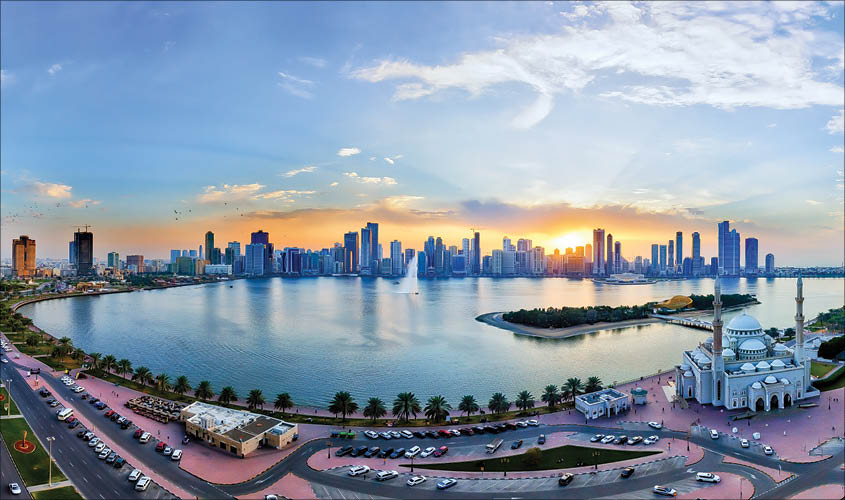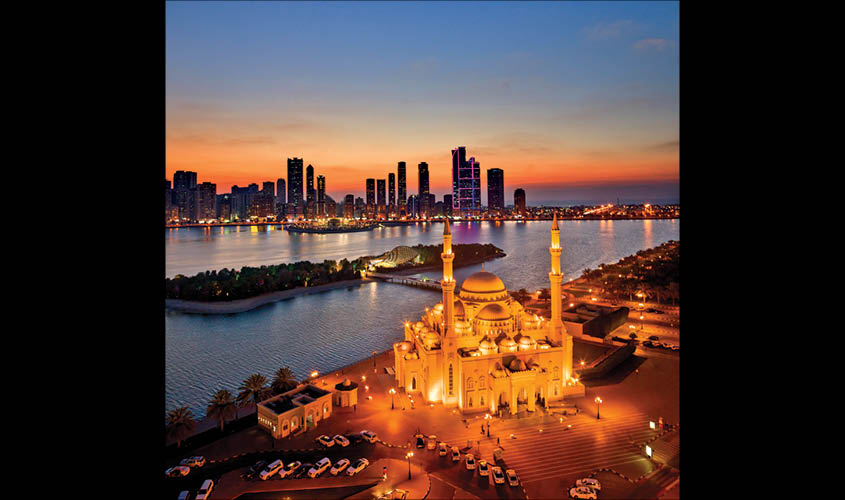A melting pot of cultures and a meeting point for tradition and modernity, Sharjah offers a uniquely unforgettable experience to every visitor. Anindya Rai Verman, who recently travelled to the emirate, writes about the sights he saw, the people he met and the spiritual connect he felt with the place.
Sharjah subtly steals hearts, both of the first-time visitor and of those who are revisiting this cultural capital of the United Arab Emirates.
Before landing in the emirate, you would probably already be aware that Sharjah, a bustling city, is a shoppers’ delight, with its plethora of souqs (traditional markets), malls, hypermarkets and supermarkets, as much in the heart of the city as much farther afield. You would also be expecting skyscrapers and high-end cars zipping past on the wide and clean motorways of this enchanting emirate. That knowledge just gets reconfirmed once you are physically in Sharjah, the only emirate in the UAE overlooking the coastline on the Arabian Gulf to the west and the Gulf of Oman, with the coastal towns of Kalba and Khor Fakkan, to the east. The vast white-sand beaches of the Arabian Gulf and the shimmering sea were clearly visible from my ninth-floor hotel room.
But there is a much subtler element that is to be actually felt while in Sharjah. The realisation of that element would perhaps be much more acute for those of us who are permanently chasing multiple deadlines and delivery schedules back home, trying to meet the pace of such busy cities as Delhi and Mumbai. In contrast, Sharjah connects with you at a deeply spiritual level.

For instance, the sublime peace and tranquility that one experiences inside the iconic Al Noor Mosque, on the banks of the Khalid Lagoon, can be life-transforming. With its calligraphic inscriptions from the Holy Quran and intricately decorated domes, arches and pillars, it restores one’s faith in the human values and qualities of love, charity, faith and friendship. Inside the resplendent interiors of the carpeted mosque, one can soak in the heritage of Islamic traditions and experience the way Arab culture has evolved over time. Also, being served Arabic coffee (gahwa) with dates at the mosque is an experience that gets etched in one’s memory.
It is for good reason that Sharjah is called the “Heart of History”. It is documented that the first humans to ever move out of Africa settled in Sharjah some 125,000 years ago. If the glitz is quite apparent in today’s Sharjah, a closer look reveals how beautifully the emirate has managed to combine the traditional and the modern, the religious and the scientific into an eclectic mix that proves enlightening for any visitor.
There are numerous award-winning museums, galleries, aquariums and conservation centres in this city. Here, one can learn about the origins of our planet, as well as about the evolution of the Islamic civilisation; about classic cars and airplanes, as well as about Arab traditions. It comes as no surprise that the desert emirate has been bestowed such titles as the “Capital of Islamic Culture for 2014” and “Capital of Arab Tourism for 2015”.
Still, Sharjah is a work in progress, and hence each fresh visit is bound to throw up new surprises and discoveries. This year in particular holds special significance for the emirate. Officially declared in the UAE as the “Year of Zayed”, 2018 marks 100 years since the birth of the late Sheikh Zayed bin Sultan Al Nahyan, the Founding Father of the UAE, who passed away in 2004.
One of the stated objectives of the “Year of Zayed” is that it will “feature a series of events and initiatives in the UAE and internationally…and promote the values that he [the late Sheikh Zayed] displayed throughout his life in creative and interactive ways”.
Interacting with the locals in Sharjah, the visitor is touched by their courtesy and hospitality. I was fortunate enough to be taken, as part of a group, to the ornate heritage house of one such local, Fatima Moghani, where the traditional welcome simply bowls you over. Used to hosting tourists, Moghani welcomed us at the tidy majlis (reception area) with women wearing a traditional black cloak and long scarf wrapped around the head. The majlis was fragrant with the incense of Oud smoke, and the hosts were showering us with flower petals. We were offered rose water to wash our hands before entering the household. Once inside, we were served Arabic coffee with dates, that our guide told me is a key ritual at any of the emirate’s households. To the coffee is added cardamom, saffron and sometimes even rose water, he said. Those in the household helped me wear, for the first time, a traditional Arabic men’s dress; the women in our group also wore the traditional dress.

Later, it was time for a gala lunch with all of us sitting on the floor, as per tradition. The menu included grated baby shark cooked in spices, harees, hummus, Arabic style chicken biryani, a delicious preparation of sea bream and dates. This was followed by fabulous desserts that included phirni and coconut cake decorated with rose petals. Hospitality has to be tasted the Sharjah way to be believed!
Does the mention of rain seem incongruous in a story about a desert emirate? Well, the answer to that question can be found in the “Rain Room”, an installation by Random International, a London-based collaborative studio. At this one-of-its-kind, thermally-controlled permanent installation, the water drops hardly touch, much less drench you, even as the artificial rain pours on you with profusion. “The trick,” our guide said, “is to walk slowly and not close to each other so that the thermal sensors can detect the body temperature and not let the water drops touch you.”
On the northern shores of the Khalid Lagoon, a visit to the Butterfly House inside the magnificent Al Noor Island—a landscaped garden that is home to over 85 plant species and over 50 species of birds—lets you witness how butterflies are hatched at humidity higher than normal, and emerge from their chrysalis. A half-hour stay inside the Butterfly House will perhaps make you start sweating, but the “controlled conditions” are best for the butterflies, of which there are over 20 exotic varieties from around the world here.
That Sharjah cares for its wildlife is clearly evident. We visited the Al Hefaiyah Mountain Conservation Centre, located at the base of the Hajar Mountains on the outskirts of Kalba, around 130km east of Sharjah city via the main Sharjah-Kalba Road. On the drive to Kalba from Sharjah, our guide pointed to a building at a distance and said: “That’s where injured falcons are taken care of.” Another must-visit site, the Al Hefaiyah Centre hosts 30 native mountain and desert species, and includes landscaped enclosures for Arabian leopards, wolves, tahrs and caracals.
A visit to Sharjah cannot be complete without actually being in Mleiha, about an hour inland from Sharjah city. You witness here the archaeological and burial sites, caves, as well as structural remnants of an agricultural settlement, among countless other artefacts.
But if you think Mleiha is only for history buffs, you are dead wrong. For, nothing can beat the fun when you take to the Desert Safari, which involves “dune bashing” or desert driving. Navigating a car on these sand dunes is a massive adventure, both for the driver and for his passengers, given the precipitous rise and fall, the twists that the vehicle goes through. Given the sheer acrobatics of it! Then we reached the iconic Camel Rock, and after sundown we headed for a star-gazing site for an out-of-this-world rendezvous with the night sky. A typical Arabic dinner amid desert campfires followed, and I thought of the word shukran, which in Arabic means “thanks”. As you leave the emirate, you too would want to say, “Shukran, Sharjah, for all the lovely memories.”
The author was in Sharjah at the invitation of Sharjah Commerce and Tourism Development Authority

